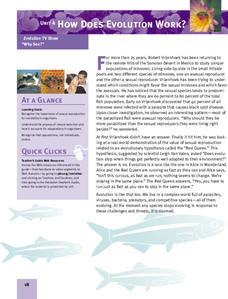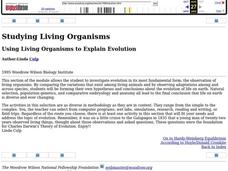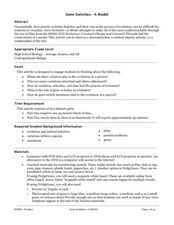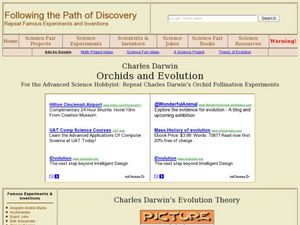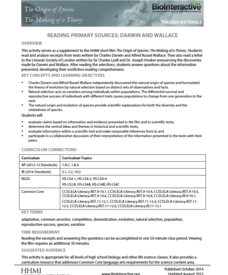California Academy of Science
Human Evolution
As the great and hilarious Tim Minchin once said, "Science is simply the word we use to describe a method of organizing our curiosity." Science is more than just a guess; it is based on questions, observations, and evidence. High...
Serendip
Evolution and Adaptations
Survival of the fittest isn't just for the movies! A five-part lesson explores several different species with known adaptations and analyzes them for their survival strategies. Using both video and research data, scholars draw...
Curated OER
Introduction to Adaptation
Tenth graders observe collections of specimens and discuss their answers to provided questions. They explore common ancestry, homology, analogy, adaptive radiation, and evolution, while formulating creative answers based on their...
Cornell Lab of Ornithology
Jump, Glide, or Fly? Exploring Bird Evolution
How have birds evolved from prehistoric animals? With the three-part lesson, small groups first research different prehistoric animals and determine whether they are birds. Then, scholars explore different bird adaptations using the Flap...
ARKive
Biodiversity and Evolution – Darwin’s Finches
Teens experience natural selection firsthand (or first beak) in an activity that has them act as finches foraging for food. Using different household items to act as different beak styles, your little finches will collect as much...
Curated OER
All Ears for Adaptation
Learners discuss different characteristics that enable animals to adapt to their environments. They work in pairs with one partner standing about one foot behind the other partner and cup their hands around their ears with palms forward....
Curated OER
How Does Evolution Work?
Students are introduced to how the process of evolution works. As a class, they review the characteristics of natural selection and how those with advantageous traits reproduce and survive. To test this theory of natural selection,...
Curated OER
The Effect of Natural Selection on Genes, Traits and Individuals
Rotating through five stations, evolutionary biologists explore the question of how changes in DNA facilitate the changes in a population over time. High-quality, colorful cards of animals, skeletons, skulls, and DNA sequences can all be...
Curated OER
Mimicry: An Example of Adaptation
Learners are able to explain the relationship between adaptation and ability for survival and reproduction. They are able to give examples of a series of adaptations that would support the idea that evolution is a series of minor...
Curated OER
Using Living Organisms to Explain Evolution
Students investigate evolution in its most fundamental form: the observation of living organisms. By comparing variations that exist among living animals, students formulate their own hypotheses and conclusions about the evolution of...
Curated OER
Thumbs Up, Thumbs Down: Grasping the Idea of Evolution
Students compare their performance of a series of tasks using their thumb and fingers to their performance of the same tasks without the use of their thumb. They discuss the role of fine and gross motor skills and speculate on the role...
Curated OER
Symbiosis and Co-evolution
By choosing a species and researching an adaptive symbiotic relationship it shares with another species, your students are able to investigate a symbiotic relationship in a lab setting. They create a presentation using a variety of...
Curated OER
Leaves: All-Natural Solar Collectors
Take a good look at tree leaves and notice the adaptations for collecting solar energy. Pupils trace the margins of five different leaves onto graph paper and count the number of squares covered. They then relate this infomation to the...
Curated OER
Gene Switches- A Model
Students explore genetic variation within a population. In this genetic adaptation instructional activity, students investigate the reasons contributing to genetic adaptation. Students collaborate and analyze DNA models. Multiple...
Curated OER
How Evolution Works
Learners examine the term natural selection and what behavioral adaptations are. In this evolution lesson students view videos about evolution and perform experiments that simulate populations that interplay between the forces of...
Curated OER
Ecology and Evolution
Students identify the different taxonomic classifications of organisms. In this biology lesson, students create their own organisms and make some changes according to environmental conditions. They present their work in class.
Curated OER
Adaptation and Mimicry - Biology
Young scholars compare and contrast adaptations involving camouflage, warning coloration, and mimicry. They explain the relationship between adaptation and ability for survival and reproduction. Students define Batesian and Mullerian...
Curated OER
What Proof is There to Support Biological evolution?
Young scholars identify who developed the theory of evolution. The concepts of adaptation and development are discussed. The age of the earth is explored in relationship to the development of various species. The condition of the...
Curated OER
Orchids and Evolution
Students study Charles Darwin's evolutionary theory and how he applied it to orchids. In this evolution lesson students repeat Darwin's orchid pollination experiment.
Curated OER
Whale Adaptations
Students explore whales and how they have adapted to survive in the ocean. In this whale adaptations lesson students complete several activities that allow them to investigate animal adaptations.
Curated OER
Mice Rule!
Students explain what biodiversity is and how adaptive features are maintained in a population. In this biodiversity lesson students complete a simple activity involving mouse populations.
Howard Hughes Medical Institute
Reading Primary Sources: Darwin and Wallace
Take your classes back in time. Learners read real historical texts from both Darwin and Wallace as well as an announcement of their findings. Using guiding questions, they make inferences and draw conclusions from the information in the...
Curated OER
Molecular Approaches to Evolution
Students examine the molecular studies of organisms that have led to a new era in their understanding of speciation and evolutionary relationships. Students study the allelic frequency of genes controlling specific molecules and assess...
Curated OER
Structures That Reveal Common Ancestry
Float like a butterfly, sting like a bee, check out wing shapes for common ancestry! Beginning biologists compare wings as analogous structures and discover that environment influences evolution of adaptations. A third activity relies on...






